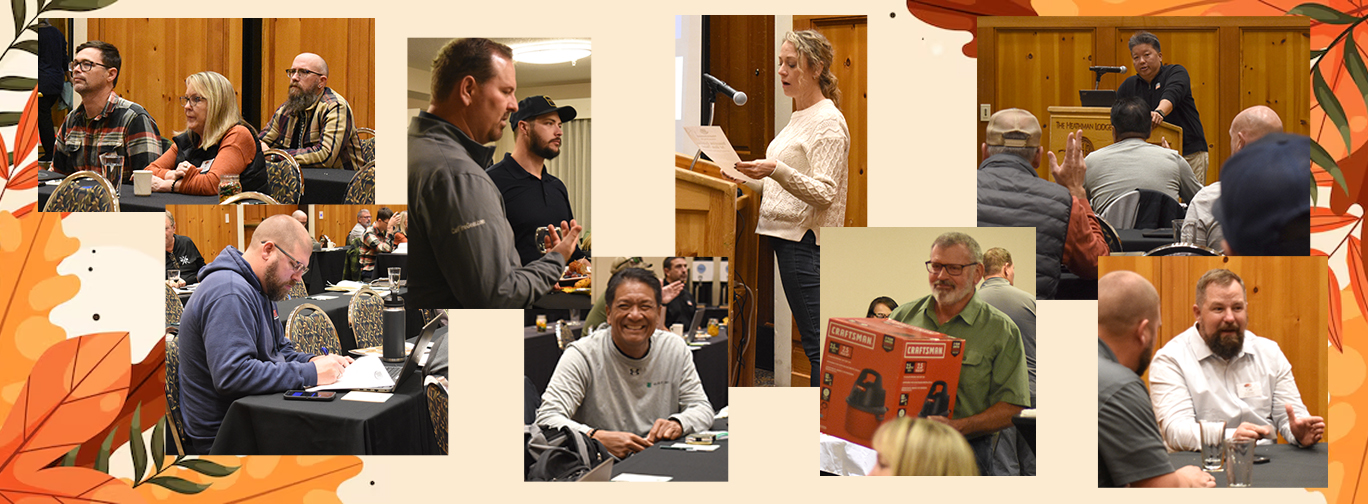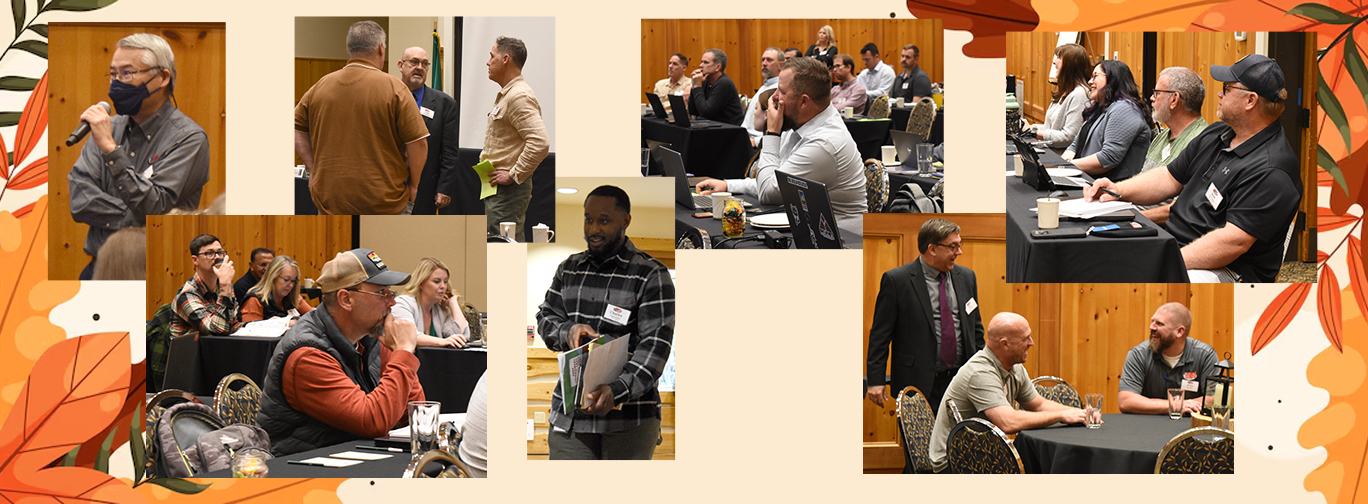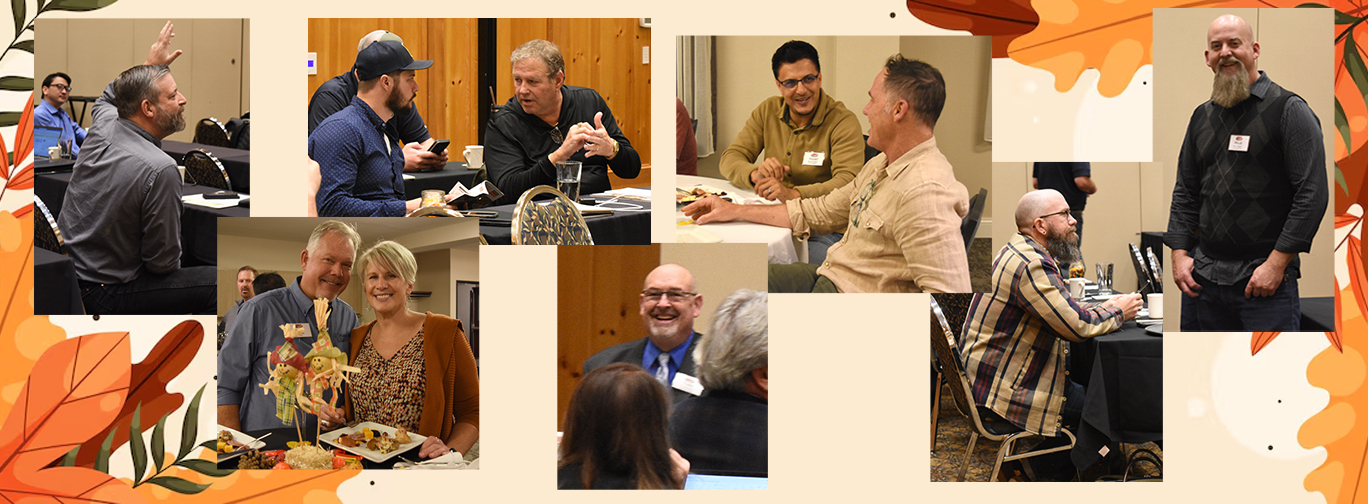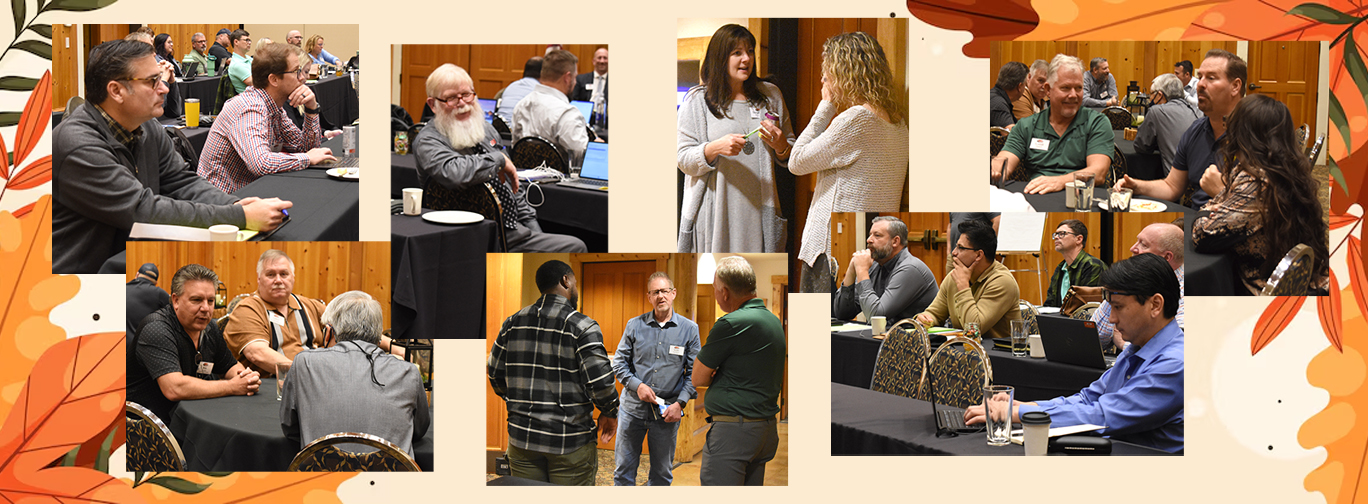
WABO PRESIDENT’S REPORT - by Ray Cockerham, CBO
As the leaves turn and start to fall off the trees I'm reflecting on the six months I've been honored to serve as your president of the Washington State Association of Building Officials. I look at the work of individuals and groups and I'm amazed at what this collective can and has accomplished.
It's impossible to take every opportunity to participate in all the work WABO does. I would like to acknowledge the work that was done over the last six months, but the understanding is it's only what I know there's more that's happened, there's more that's been done, and there's more planned in the hearts and minds of WABOnians.
Understanding that this is not a complete list, some of the most extraordinary accomplishments and endeavors include:
- A WABO member was elected president of ICC in October.
- New appointment to the State Building Code Council,
- The first (in recent memory) liaison effort to the Washington Association of Permit Technicians.
- A record setting newcomers’ attendance earlier this year,
- the efforts of Technical Code Committee and subcommittees to respond to legislative tasks.
- Government relations was busy last year, this year seems to be moving fast as well.
- We are all grateful for the contribution that Code Official Accreditation Program has made to individuals and our industry; from the initial dream to the now state license program that provides a class setting fundamental education that positions our industry to replace and draw in new talent.
- The progress in developing the Energy Code review and inspection credential is commendable.
- I'm a especially thankful for the constant and continuous support Tara Jenkins and the WABO office provide our membership. All these accomplishments include Tara’s team and her “hands on” guidance.
In this report I want to recognize, not by naming names, but by recognizing our collective contributions, values and results. This is what WABO is, and this is what WABO does.
Thank you all for the privilege and the honor to serve as your president.
Sincerely,
Ray Cockerham

Committee Reports
Technical Code Development Committee - Chair Micah Chappell, MBA, CBO
TCD discussed the ICC 2027 Committee Action Hearing #2 taking place in Long Beach, Ca. A significant proposal that we discussed for the hearings was addressing short-term rentals and how the Code may regulate them. Scholarships were awarded to many WABO members to attend the hearings. Some first-time attendees made the trip to Long Beach and experienced all the process had to offer. The Group B ICC CAH #1 will be in April of 2025 in Orlando, FL.
TCD provided updated information on the 2024 WA Code adoption process and several of the proposals that had been submitted. WABO TCD has had the opportunity to have active sub-committees for some legislative topics including single exit six-story multi-family residential, and multi-plex house up to six-unit structure being regulated by the Residential Code. These legislative priorities on construction codes will be reviewed by a special State Building Code Council Technical Advisory Group (TAG) for inclusion in the 2024 State code adoption. There has not been a final deadline set for the WA-Energy Code proposed changes yet. Please access the SBCC website for further information.
TCD meeting schedule is posted on the WABO website in the Code Development link and we are always eager to have participants.

Certification & Registration Committee - Chair Brian Smith, CBO, ACO
Tara Jenkins reported that the C & R Committee has contracted with Evergreen Technology Consulting to develop the written exam questions for the WSEC Plans Examiner Certification Program. Written exam questions have an ETA back to the WABO office by December 31, 2024 for subcommittee review. The residential written exam questions have been received from WSU and will be reviewed by the subcommittee. Forward progression of the program is occurring but was delayed slightly due to state litigation on the Energy Code. Committee Chair Brian Smith is working on obtaining a set of residential plans that can be utilized as part of the written exam.

Emergency Management Committee - Chair Quyen Thai, MCP, CBO, CFM, MPA
WABO Members, I’m pleased to announce that this year has been a very productive year in Emergency Management. From finishing up the Everett URM Survey pilot program with Washington State EMD to starting Tacoma’s URM Survey as well as additional post-disaster training at Long Beach during the ICC Committee Action Hearing that Hoyt Jeter attended, this year has been quite busy.
On November 15th, the City of Tacoma along with 65 staff and volunteers from other jurisdictions such as Seattle and Bainbridge Island, will be completing the URM survey of our downtown region consisting of potentially over 1,000 URM buildings. This project will be only the first phase as Tacoma’s goal is to survey the entirety of the city.
Next up on the pilot program is hopefully Spokane City with Jonathan Goldsmith! We urge that you speak with your leadership to see about being on the list to have your jurisdiction be surveyed since much of the work will be done by Washington EMD in terms of coordination and financial cost. This is a great opportunity now to have your jurisdiction get a complete inventory of your URM (if you feel you have any).
During this year’s ICC Committee Action Hearing #2, Hoyt was able to attend the train the trainer “When disaster strikes” training. Hoyt indicated that this was an extremely helpful and enlightening training opportunity as there were different perspective through ICC that he wasn’t aware of. The training will not be currently accepted for WAsafe training, but the committee was following the training for reference.
On a similar note, WaSAFE has created a refresher course for those who have already taken it. Please remember to register to take the refresher course if your certificate is set to soon expire.
There will also be potentially an in-person post-disaster training held in Spokane on March 5th (so hold the date)! Further information will be provided as details get ironed out so keep your eyes peeled for it.
Finally, I want to give kudos to all the Washington Emergency Management Committee members for bringing to the table further insight and perspective as we try and make Washington State better prepared and safer place for us all to live in.

Education Committee - Chair Ryan Mumma, CBO, ACO
Tara Jenkins informed the members in Ryan Mumma's absence and announced that the 2025 Annual Education Institute schedule has been finalized and instructors’ agreements are being secured.
Finance Committee - Chair Andie Lorenz, CBO, ACO
Angela Haupt presented in Andie Lorenz's absence and provided the membership with an overview of WABO's 2024/2025 1st Quarter financials.

Accreditation Committee - Chair James Tumelson, CBO, MCP, ACO
The Accreditation Committee oversees the Accredited Code Official (ACO) and the Code Official Accreditation Program (COAP). All four years of the program are effectively being taught concurrently and students had the option of enrollment into years one and two simultaneously. Enrollment into COAP opens May 5th, 2025 and space is limited so please keep your eyes open for this future opportunity.
Additionally, we have launched the self-guided course on Washington State plumbing so please review our website for more information.

TCD Scholarship Reports
2025 Committee Action Hearings Group A #2 - Long Beach, CA
Angela Haupt - City of Kirkland
I returned from the ICC 2024 group A CAH#2 in Long Beach a few days ago. This was the first CAH#2 since ICC changed the code development process. It was interesting to see the action the committees took the second time the proposals came in front of them. A frustrating thing was with the WUIC. That code has been adopted by very few places, but the proponents for the proposals took forever to testify. That was the first code heard, and it put the hearings behind on the first day. With all the committees, it seemed that too often the proponents submitted comments that didn’t address the feedback they had been given by the committee at the first CAH. It was a bit frustrating because it seemed like they were wasting our time. I testified on four proposals I think, and in at least two of them, part of my testimony flat-out stated that the proponents had not listened to the committee.
One good thing about this second time around is that the Egress Committee didn’t overly discuss the proposals after the completion of the testimony. This helped that portion of the hearings move along at a good pace. Overall, I think that WABO was fairly successful when it came to proposals we testified on or wrote. There were a couple of them that we will need to submit public comments on, but it felt like we had mostly positive outcomes. Now it’s time to get ready for group 2 at the state level and group B for ICC.

TCD Scholarship Reports (cont.)
2025 Committee Action Hearings Group A #2 - Long Beach, CA
Lia Sommer - Pierce County
My experience at my first ICC hearing in Long Beach was truly enlightening! The atmosphere was dynamic and fast-paced, with a diverse group of attendees. Code officials focused on fire and life safety, while industry professionals advocated for specific changes to the codes. This mix really sparked meaningful discussions about introducing new requirements and reevaluating existing ones. I appreciated the structured approach to the code revision process, which includes committee action hearing one, a second hearing, and a public hearing and voting. Each stage provided plenty of opportunities for public input, allowing for a thorough examination of the issues.
One of my biggest takeaways was the complexity of revising international codes. I gained a better understanding of the review process and how essential stakeholder engagement is in shaping these codes. I also appreciate how important it is to embrace different perspectives. Our views can often be limited by our personal experiences, and engaging with others in the industry really broadens our horizons. Listening to a variety of viewpoints underscored the collaborative nature of code development and the importance of collective input.
There were a lot of exciting discussions in CAH#2; for example, P54-24 was about adding new language regarding heat pump water heaters in the code so that they can be installed correctly. I have seen many heat pump water heaters being installed in dwelling units, and some installers get them wrong. However, the discussion here is whether the detailed installation guide should be in the code for the installers to follow or if it should be in the manufacturers’ installation guide. After considerable discussion, the committee ruled against this addition to the 2027 International Plumbing Code. This experience has enhanced my understanding of the code development process. Thank you again for the chance to work with the WABO code development committee and attend the ICC hearing.
Quyen Thai - City of Tacoma
The 2024 Annual Business Meeting in Long Beach, California, marked a significant milestone for both Washington State, WABO, and the Pacific Northwest code officials. With Dave Spencer, a local Washingtonian, running for President of the International Code Council (ICC), this year's ABM held
particular importance. As the ICC celebrated its 30th anniversary, the event featured notable guest speakers like Erik Qualman and showcased the organization's growth through various awards presented at the Gala. I had the honor of attending my first Emerging Leaders Membership Committee meeting as a newly
nominated member. This experience provided invaluable insights and networking opportunities with both current and former committee members. Notably, I interacted with Mike Boso, Vice-President of the ICC, further enriching my professional network and knowledge base.
The ABM also marked the ICC's inaugural second committee action hearing under the newly implemented system designed to streamline code change processes. Despite initial confusion among some audience members and committee members regarding the new rules, ICC staff efficiently provided clarity and ensured a smooth hearing. As chair of the TCD Fire Safety subcommittee, I actively participated in discussions and presented proposals and oppositions. WABO TCD demonstrated strong performance in the fire-safety domain, successfully advocating for five out of five key positions. Additionally, I independently took the initiative to speak on several proposals, although with varying levels of success compared to my advocacy on behalf of WABO TCD. Moving forward, it is crucial to consider adopting a shorter, more concise name for WABO TCD to facilitate introductions.
Overall, the ABM and CAH #2 provided a valuable experience. I am grateful for the opportunity to attend and represent WABO TCD.
Stacy Criswell - City of Monroe
I was very excited to receive a scholarship to be at the ICC code hearings in Long Beach this year. This is now my 4th code hearing and every time I learn so much about what it takes to modify the codes that we are tasked with enforcing. I was just explaining to my executive team that we are still building and inspecting buildings to the 2018 codes, we are processing and starting to inspect under the 2021 codes, we are working with the SBCC on amendments to the 2024 state codes, and I was just part of proposed amendments to the 2027 model code... Talk about a whirl wind of codes all jumbled together.
This hearing was different than others that I have attended in the fact that testimony from the floor was directed at the code development committees instead of trying to convince code professionals to vote. In my mind, it was more of an opportunity to really see "behind the curtain" if it were to see how the committees makes decisions in a transparent way instead of just getting their report on all the code provisions.
One of the biggest highlights for me this year was being part of the WUI and fire code hearings where testimony and subject matter experts were really trying to make the California WUI code the base line for the model WUI code. Others might disagree with my take on this, but so many of the testimony was from California fire personnel talking about the different fires they have had over the last 10 years. Much of it having to do with how the different communities survived or didn't survive things like exposure to embers, structure hardening like non-combustible siding, unprotected decks, and the ever-popular defensible space requirements. There was even a big push to create only two zones, so you are either in or out of a WUI zone. No real test data to prove anything, but lived experience of a few fires in a certain area showed that only doing something halfway instead of all the requirements didn't work...
If you want to know more about how and why the codes change and have a better answer for when we get stuck being the bad guys on new requirements, attending a code hearing is what you need. I strongly recommend you get involved even if its only a few meetings.
|